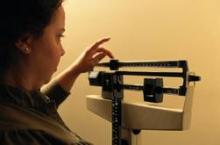The amount of potential weight gain from antidepressants depends on the particular drug, though the differences among the medications are modest, according to a recent study.
Antidepressants nortriptyline, amitriptyline, and bupropion were all associated with less weight gain than citalopram, Sarah S. Blumenthal of Massachusetts General Hospital in Boston and her associates reported online (JAMA Psychiatry 2014 June 4 [doi:10.1001/jamapsychiatry.2014.414]).
The researchers pulled prescribing data and all recorded weights for 19,244 adults aged 18-65 during the 12 months after they were prescribed an antidepressant. The medications of interest included the following: amitriptyline, bupropion, citalopram, duloxetine, escitalopram, fluoxetine, mirtazapine, nortriptyline, paroxetine, venlafaxine, and sertraline.
Prescribing data for 3,366 other adults not receiving psychotropics but receiving the asthma medication albuterol sulfate or obesity medications orlistat, phentermine, and sibutramine also were pulled to confirm study validity (assay sensitivity). The data came from the Partners HealthCare electronic health record, used by Massachusetts General Hospital, Brigham and Women’s Hospital, and community and specialty outpatient clinics in Boston.
The participants’ weight change in 3-month increments over 12 months was compared to that seen with citalopram. The researchers adjusted for sociodemographic characteristics and clinical variables, including depressive or anxiety disorder, recent tobacco use, pain disorder, and a comorbidity index to consider overall illness burden.
Nortriptyline (P less than .001), amitriptyline (P = .001), and bupropion (P = .02), in order from greatest to least difference, were the only medications associated with less weight gain than citalopram. The asthma and obesity medications also showed less weight gain than citalopram. Weaker differences were seen in those who took antidepressants for less than the full 12 months of the study period.
Ms. Blumenthal and her colleagues cited several limitations. For example, the subset of patients with depressive symptoms who have diminished appetites and resulting weight loss may experience weight gain after treatment. In contrast, other patients who might gain because of depressive symptoms might experience weight loss after taking antidepressants. "It is difficult to predict the net effect on observed weight change without a means of distinguishing these phenomena," they wrote.
The study was supported by the National Institute of Mental Health. Ms. Blumenthal had no disclosures, and her colleagues disclosed relationships with several pharmaceutical and research companies.


